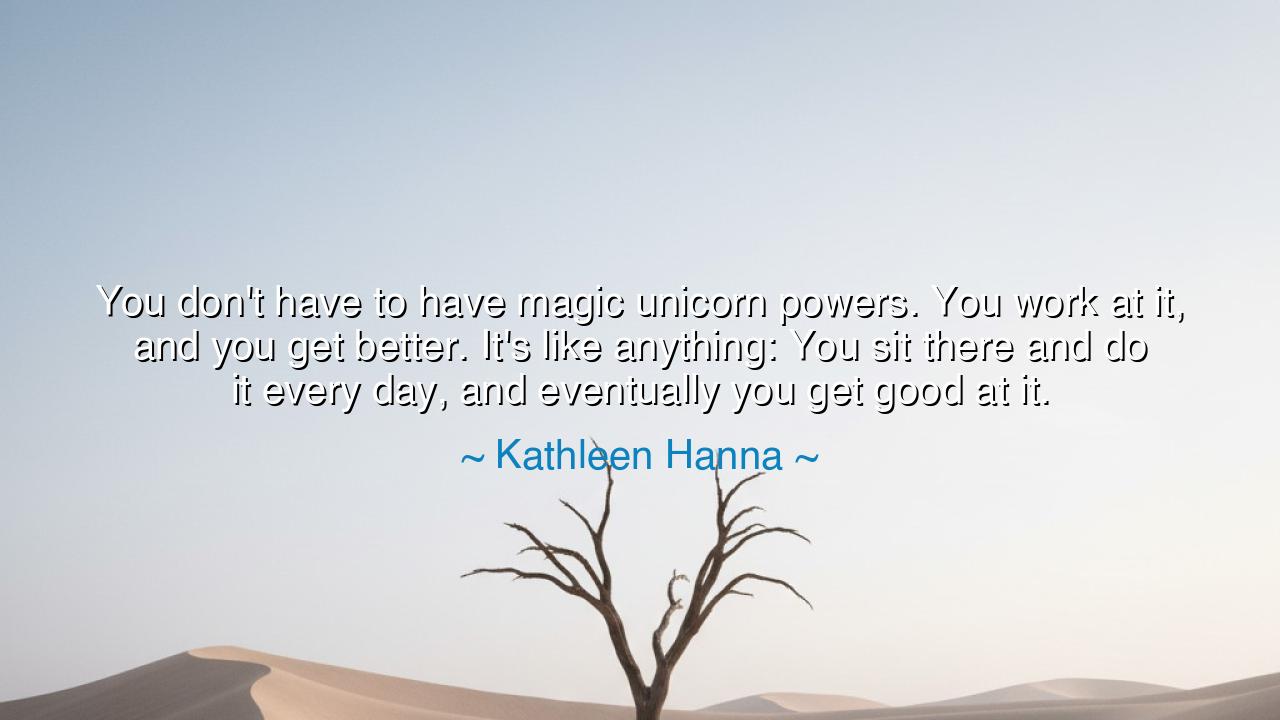
You don't have to have magic unicorn powers. You work at it, and
You don't have to have magic unicorn powers. You work at it, and you get better. It's like anything: You sit there and do it every day, and eventually you get good at it.






The words of Kathleen Hanna, “You don’t have to have magic unicorn powers. You work at it, and you get better. It’s like anything: You sit there and do it every day, and eventually you get good at it,” shine with the clarity of ancient discipline. She strips away the illusions of talent as sorcery or destiny and proclaims the eternal truth: greatness is born not from enchantment, but from steady labor.
The image of magic unicorn powers is the dream of effortless mastery, the fantasy that some are chosen by fate while others are left behind. Hanna casts aside this myth, teaching that the path of excellence is open to all who are willing to toil. It is not the rare gift of the heavens, but the daily choice of the heart and the hand.
To work each day is the secret. The ancients called this constancy — the rhythm of practice that, like the rising sun, returns without fail. Through repetition, the rough stone is polished, the weak hand becomes strong, and the faltering voice grows firm. To grow better is not the fruit of sudden miracles, but of patience and perseverance.
Thus, Hanna’s words speak to future generations: do not wait for magic, for none is needed. Sit, labor, and endure, and in time you will be good — not by gift, but by grit. Let this be the teaching: that mastery is not bestowed, but earned, and the crown of skill rests upon the brow of the diligent.






HTHue Thanh
Hanna’s message seems to suggest that we all have the ability to improve, as long as we’re willing to put in the work. But do you ever feel like it’s harder for some people than others? Maybe they’re juggling other responsibilities or facing external challenges. Does hard work always equate to improvement, or are there some factors that can’t be overcome just by trying harder? It’s a comforting idea, but I wonder about the limits of effort in certain circumstances.
DNDuyen Nguyen
Kathleen Hanna’s quote brings up a good point: it’s about effort, not magical powers. I wonder though, how do we stay committed when the progress is slow? Is there a trick to making sure we keep working at something every day, even when it feels like we’re not getting anywhere? Or is persistence enough on its own? I’d love to hear how others maintain that level of dedication over time.
PAQuach Phuong Anh
This quote really shifts the focus from waiting for some external factor to kick in, to just doing the work. It makes me wonder: are we all capable of improvement if we simply stay consistent? Or are there certain talents that some people just have, no matter how much practice they put in? It’s a great reminder that progress doesn’t always come instantly—sometimes, it’s the little things done every day that lead to success.
PANguyen Hoang Phuong Anh
I love how Kathleen Hanna breaks things down into something so simple. Practice is key, and there’s no magic involved, just dedication. Do you think this applies to all areas of life, or are there exceptions? Could there be situations where talent or opportunity plays a more significant role than consistent effort? It’s easy to feel discouraged when you’re not seeing immediate results, but how do you stay motivated during those times?
NXNguyen Xiem
Kathleen Hanna’s words really resonate with me because they challenge the idea of needing extraordinary abilities to succeed. It's all about putting in the time and effort. But do we sometimes get too caught up in looking for shortcuts or magic solutions? Does the idea of constant practice seem too daunting to some, especially when results don’t come quickly? I’m curious—how long do you think it typically takes for someone to truly get ‘good’ at something?